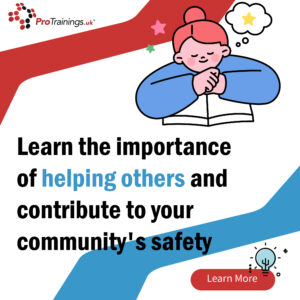The Importance of First Aid Training in UK Schools
First aid training is a life-saving skill that everyone should learn, and introducing it in schools can make a significant impact. In the UK, more schools are recognising the importance of equipping students with first aid knowledge, giving them the ability to respond confidently in emergencies. This blog explores why first aid training in UK schools is so important and the benefits it brings to students and society.
1. Developing Essential Life-Saving Skills
First aid training equips students with the skills they need to handle medical emergencies such as choking, bleeding, burns, and even performing CPR. By teaching children these essential techniques early on, we can:
- Save Lives: Quick intervention can be the difference between life and death. Students who know basic first aid can offer immediate assistance before professional help arrives.
- Reduce Injury Severity: When students understand how to treat injuries like cuts or sprains, they can help prevent the injury from worsening.
- Increase Confidence in Emergencies: With proper training, students are more likely to stay calm and act effectively in emergencies, both in school and in the wider community.
2. Promoting Responsibility and Leadership
First aid training fosters a sense of responsibility among students. They learn the importance of helping others and contributing to their community’s safety. In addition:
- Leadership Skills: First aid education helps develop leadership qualities. Students trained in first aid often become leaders in critical situations, guiding others to safety and making informed decisions.
- Responsibility for Health and Safety: Learning first aid encourages students to take responsibility not only for their own health and safety but also for their peers.
3. Supporting Mental Health Awareness
First aid training is not just about physical injuries—it also plays a crucial role in raising awareness of mental health issues. Many first aid courses now include elements of Mental Health First Aid, helping students recognise signs of mental distress, such as anxiety, panic attacks, or depression. By incorporating this into the curriculum:
- Students Learn Empathy: They become more attuned to the emotional well-being of others, promoting a culture of compassion and support.
- Early Intervention: Identifying signs of mental health issues early on can lead to timely intervention, helping those in need receive the appropriate care.
4. Meeting Educational Requirements
The UK government has recognised the value of first aid in education, and in 2020, it became a compulsory part of the national curriculum in England. Under the new guidelines:
- CPR Training: Secondary school students are required to learn cardiopulmonary resuscitation (CPR).
- Emergency First Aid: Students are also taught the recovery position, how to treat common injuries, and how to contact emergency services effectively.
- Defibrillator Use: Some schools are introducing training on how to use automated external defibrillators (AEDs), which are often available in public spaces.
5. Creating a Safer School Environment
Having students trained in first aid contributes to a safer school environment. In the event of an accident on school premises:
- Immediate Response: Trained students and staff can respond quickly, potentially preventing situations from escalating.
- Lower Risk of Serious Injury: Prompt first aid treatment reduces the risk of injuries becoming more severe, leading to better health outcomes.
6. Preparing Students for the Future
First aid training is a practical skill that will benefit students throughout their lives. As they grow older, they will carry this knowledge into their workplaces, homes, and communities:
- Employability: Many employers look favourably on candidates who are certified in first aid, particularly in industries where health and safety are key.
- Community Contribution: First aid knowledge allows students to contribute positively to society, whether by helping a stranger in an emergency or being a reliable source of support for family and friends.
Conclusion
First aid training is a crucial life skill that should be an integral part of education in UK schools. By equipping students with the knowledge and confidence to respond to emergencies, we are not only creating safer school environments but also building a future generation that can make a positive impact on society. As schools continue to embrace first aid training, we move closer to a culture of safety, responsibility, and care for others.
Sign up on our first aid for schools program at Student First Aid.
Visit www.first-aid-online.co.uk today for top-quality first aid equipment you can trust!
